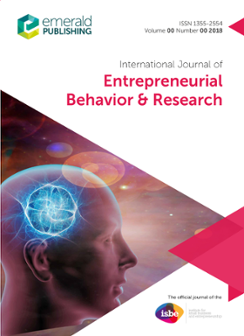学术衍生融资是商业和增长模式的问题吗?西班牙的案例
IF 4.7
2区 管理学
Q1 BUSINESS
International Journal of Entrepreneurial Behavior & Research
Pub Date : 2021-12-23
DOI:10.1108/ijebr-02-2021-0127
引用次数: 3
摘要
本研究通过考虑三个研究问题来探讨学术衍生企业的发展与融资类型之间的关系:学术衍生企业在融资方面有何不同?在何种程度上,出于何种原因,aso在融资方面存在差异?商业和增长模式如何决定不同类型融资安排的选择?设计/方法/方法本研究采用基于39个西班牙aso的扎根理论定性方法。发现ASO融资存在异质性,融资资源的选择与ASO的经营模式和成长模式有关。此外,每个自治组织内部都有一些关键的融资节点。研究的局限性/启示本研究促进了对自主服务组织的决定因素的理解,特别是在融资、商业模式和增长方向方面。这里使用的西班牙上下文可能不允许对结果进行全球推广;然而,这项研究是对考虑区域环境对ASOs影响的呼吁的回应。实际意义了解ASOs在融资方面的异质性,以及商业和增长模式如何决定不同融资来源的选择,有助于财务规划、投资决策和方案和政策的设计,这对ASOs及其利益相关者(投资者、大学和政府)都有意义。独创性/价值本研究提供了ASO融资的全面视角,证实了其异质性,不仅在融资方面,而且在一些预示着从一种融资类型转变为另一种融资类型的关键时刻。本文章由计算机程序翻译,如有差异,请以英文原文为准。
Is academic spin-off financing a matter of business and growth models? The Spanish case
PurposeThis study investigates the relationship between the development of academic spin-offs (ASOs) and the type of financing involved, by considering three research questions: How do ASOs differ in terms of financing? To what extent and for what reasons do ASOs differ in their financing? How do business and growth models dictate the selection of different sorts of financing arrangement?Design/methodology/approachThe study employs a grounded-theory, qualitative approach based on 39 Spanish ASOs.FindingsThere is a heterogeneity of ASO financing, and the selection of financial resources is related to the business and growth model of the ASO. Furthermore, there are some critical junctures for financing within each group of ASOs.Research limitations/implicationsThe study advances the understanding of the determinants of ASOs, specifically with respect to financing, business models and growth orientation. The Spanish context used here may not permit the global generalisation of the results; nevertheless, this study is a response to calls to consider the effect of regional context on ASOs.Practical implicationsKnowing the heterogeneity of ASOs in terms of financing and how business and growth models determines the selection of distinct financing sources help financial planning, investment decisions and the design of programmes and policies, which can be relevant for both ASOs and their stakeholders (investors, universities and governments).Originality/valueThis study provides a comprehensive view of ASO financing, confirming a heterogeneity, not only in terms of financing but also in some critical junctures that presage a change from one type of financing to another.
求助全文
通过发布文献求助,成功后即可免费获取论文全文。
去求助
来源期刊
CiteScore
10.20
自引率
16.40%
发文量
94
期刊介绍:
The International Journal of Entrepreneurial Behavior & Research (IJEBR) has a unique focus on publishing original research related to the human and social dynamics of entrepreneurship, and entrepreneurial management in small and growing organizations. The journal has an international perspective on entrepreneurship and publishes conceptual papers and empirical studies which bring together issues of interest to academic researchers and educators, policy-makers and practitioners worldwide.The editorial team encourages high-quality submissions which advance the study of human and behavioural dimensions of entrepreneurship and smaller organizations. Examples of topics which illustrate the scope of the journal are provided below. Topicality Nascent entrepreneurship and new venture creation Management development and learning in smaller businesses Enterprise and entrepreneurship education, learning and careers Entrepreneurial psychology and cognition Management and transition in smaller, growing and family-owned enterprises Corporate entrepreneurship and venturing Entrepreneurial teams, management and organizations Social, sustainable and informal entrepreneurship National and international policy, historical and cultural studies in entrepreneurship Gender, minority and ethnic entrepreneurship Innovative research methods and theoretical development in entrepreneurship Resourcing and managing innovation in entrepreneurial ventures.

 求助内容:
求助内容: 应助结果提醒方式:
应助结果提醒方式:


